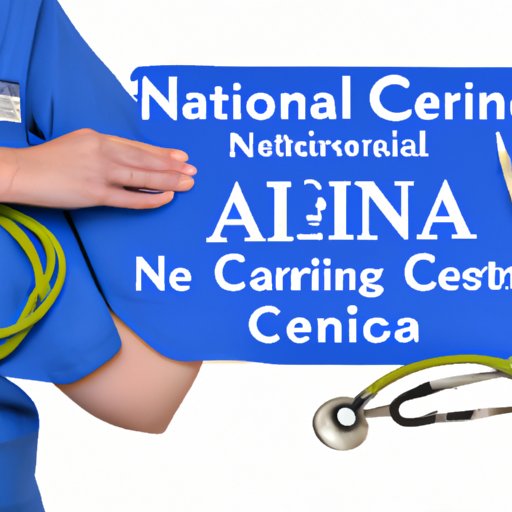Introduction
A traveling Certified Nursing Assistant (CNA) is a healthcare professional who travels from one medical facility to another to provide direct care to patients. The duties of a traveling CNA include providing assistance with activities of daily living, providing emotional support to patients, helping with medical treatments, and monitoring vital signs. Becoming a traveling CNA can be a rewarding and fulfilling career choice, as it provides the opportunity to travel and gain experience in different healthcare settings.
What is a Traveling CNA?
A traveling CNA is a certified nursing assistant who moves from one healthcare facility to another to provide patient care. They work in hospitals, nursing homes, rehabilitation centers, home health agencies, and other long-term care facilities. Traveling CNAs are usually employed by staffing agencies or travel companies that specialize in placing CNAs in short-term assignments in various healthcare facilities.

Benefits of Becoming a Traveling CNA
There are numerous benefits to becoming a traveling CNA. The primary benefit is the ability to travel and gain experience in different healthcare settings. Traveling CNAs also enjoy higher salaries than traditional CNAs because they are typically paid for their travel expenses. Additionally, traveling CNAs have the chance to build relationships with patients and colleagues in different locations, and they often receive bonuses when they complete assignments.
Research Requirements for Becoming a Traveling CNA
Before you can become a traveling CNA, you must first meet certain requirements. These include licensing and certification requirements, as well as education and training requirements.
Licensing and Certification Requirements
In order to become a traveling CNA, you must first obtain a license from your state’s board of nursing. You will also need to pass the National Nurse Aide Assessment Program (NNAAP), which is the national certification exam for CNAs. Once you have completed the NNAAP and obtained a license, you can apply for a traveling CNA position.
Education and Training Requirements
In addition to licensing and certification requirements, you must also meet certain educational requirements. To become a traveling CNA, you must have at least a high school diploma or GED. You must also complete an accredited CNA program, which typically takes 6 to 12 weeks to complete. During the program, you will learn about basic nursing concepts, such as anatomy and physiology, infections control, patient safety, and communication.

Understand the Job Description and Responsibilities of a Traveling CNA
Once you have met the research requirements for becoming a traveling CNA, it is important to understand the job description and responsibilities associated with the role.
Duties of a Traveling CNA
The duties of a traveling CNA vary depending on the healthcare setting. Generally speaking, traveling CNAs are responsible for providing direct patient care, such as assisting with activities of daily living, providing emotional support, helping with medical treatments, and monitoring vital signs. According to the Bureau of Labor Statistics, “CNAs may also help patients with bathing, dressing, eating, and other daily activities.”
Working Conditions
Traveling CNAs typically work in shifts, which can range from 8 to 12 hours. They may also work nights, weekends, and holidays, depending on their assignment. Traveling CNAs must also be prepared to work in different environments, such as hospitals, nursing homes, and home health care settings.

Develop the Necessary Skills to Become a Traveling CNA
In order to become a successful traveling CNA, it is important to develop certain skills. These include communication skills, interpersonal skills, and adaptability.
Communication Skills
Traveling CNAs must be able to effectively communicate with patients, families, and colleagues. They must be able to listen carefully and understand what patients and family members are saying, as well as express themselves clearly and concisely. Good communication skills are essential for any traveling CNA, as they will be interacting with many different people in different healthcare settings.
Interpersonal Skills
Traveling CNAs must also possess strong interpersonal skills. They must be compassionate and patient when dealing with patients and families, and be able to establish trusting relationships with them. Additionally, traveling CNAs must be able to work collaboratively with other healthcare professionals, such as nurses, doctors, and therapists.
Adaptability
Traveling CNAs must also be able to adapt to new environments quickly. They must be able to learn new skills and procedures quickly, as they will be working in different healthcare settings. Additionally, traveling CNAs must be able to handle stressful situations and remain calm under pressure.
Find Opportunities to Work as a Traveling CNA
Once you have met the research requirements and developed the necessary skills to become a traveling CNA, you must now find opportunities to work as a traveling CNA. There are several ways to do this, including networking, job boards, and recruitment agencies.
Networking
Networking is a great way to find opportunities to work as a traveling CNA. Attend local conferences and meetings related to the field of nursing, and make connections with other healthcare professionals. This will not only help you find job opportunities, but it will also help you build relationships with other healthcare professionals.
Job Boards
There are also many online job boards that list job openings for traveling CNAs. Search these sites regularly and apply for positions that match your qualifications and interests. Additionally, many healthcare companies have their own job boards, so be sure to check those out as well.
Recruitment Agencies
Lastly, there are recruitment agencies that specialize in placing traveling CNAs in short-term assignments. These agencies can help you find job opportunities in different healthcare facilities around the country. Be sure to research each agency thoroughly before signing up with them.
Conclusion
Becoming a traveling CNA can be a rewarding and fulfilling career choice. In order to become a successful traveling CNA, you must meet certain research requirements, understand the job description and responsibilities, develop the necessary skills, and find opportunities to work as a traveling CNA. With the right preparation and dedication, you can become a successful traveling CNA.
(Note: Is this article not meeting your expectations? Do you have knowledge or insights to share? Unlock new opportunities and expand your reach by joining our authors team. Click Registration to join us and share your expertise with our readers.)
